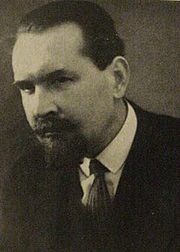
Nikolai Trubetzkoy
Encyclopedia

Trubetskoy
Trubetskoy , Трубецкой , Трубяцкі , Trubecki , Trubetsky , Трубецький , Troubetzkoy , Trubezkoi or Trubetzkoy , is a Ruthenian Gediminid gentry family of Black Ruthenian stock, like many other princely houses of Grand Duchy of Lithuania, later prominent in Russian...
; Russian
Russian language
Russian is a Slavic language used primarily in Russia, Belarus, Uzbekistan, Kazakhstan, Tajikistan and Kyrgyzstan. It is an unofficial but widely spoken language in Ukraine, Moldova, Latvia, Turkmenistan and Estonia and, to a lesser extent, the other countries that were once constituent republics...
: ; Moscow
Moscow
Moscow is the capital, the most populous city, and the most populous federal subject of Russia. The city is a major political, economic, cultural, scientific, religious, financial, educational, and transportation centre of Russia and the continent...
, April 16, 1890 - Vienna
Vienna
Vienna is the capital and largest city of the Republic of Austria and one of the nine states of Austria. Vienna is Austria's primary city, with a population of about 1.723 million , and is by far the largest city in Austria, as well as its cultural, economic, and political centre...
, June 25, 1938) was a Russian linguist
Linguistics
Linguistics is the scientific study of human language. Linguistics can be broadly broken into three categories or subfields of study: language form, language meaning, and language in context....
and historian
Historian
A historian is a person who studies and writes about the past and is regarded as an authority on it. Historians are concerned with the continuous, methodical narrative and research of past events as relating to the human race; as well as the study of all history in time. If the individual is...
whose teachings formed a nucleus of the Prague School of structural linguistics
Structural Linguistics
Structural linguistics is an approach to linguistics originating from the work of Swiss linguist Ferdinand de Saussure. De Saussure's Course in General Linguistics, published posthumously in 1916, stressed examining language as a static system of interconnected units...
. He is widely considered to be the founder of morphophonology
Morphophonology
Morphophonology is a branch of linguistics which studies, in general, the interaction between morphological and phonetic processes. When a morpheme is attached to a word, it can alter the phonetic environments of other morphemes in that word. Morphophonemics attempts to describe this process...
. He was also associated with the Russian Eurasianists
Eurasianists
Eurasianism is a political movement within the primarily Russian emigre community.-Early 20th century:Eurasianists was a political movement in the Russian emigre community in the 1920s...
.
Trubetzkoy was born into an extremely refined environment. His father, Sergei Nikolaevich Trubetskoy
Sergei Nikolaevich Trubetskoy
Prince Sergei Nikolaevich Trubetskoy was Russian religious philosopher.-Biography:As a teenager, Trubetskoy was an adherent of Herbert Spencer and John Stuart Mill. Later he became disappointed with both and turned to Schopenhauer. Study of his philosophy led Trubetskoy to a conclusion that...
was a first-rank philosopher whose lineage ascended to the medieval rulers of Lithuania
Lithuania
Lithuania , officially the Republic of Lithuania is a country in Northern Europe, the biggest of the three Baltic states. It is situated along the southeastern shore of the Baltic Sea, whereby to the west lie Sweden and Denmark...
. Having graduated from the Moscow University (1913), Trubetzkoy delivered lectures there until the revolution. Thereafter he moved first to the university of Rostov-na-Donu, then to the University of Sofia
Sofia University
The St. Clement of Ohrid University of Sofia or Sofia University is the oldest higher education institution in Bulgaria, founded on 1 October 1888...
(1920-22), and finally took the chair of Professor of Slavic Philology at the University of Vienna
University of Vienna
The University of Vienna is a public university located in Vienna, Austria. It was founded by Duke Rudolph IV in 1365 and is the oldest university in the German-speaking world...
(1922-1938). He died from a heart attack attributed to Nazi
Nazism
Nazism, the common short form name of National Socialism was the ideology and practice of the Nazi Party and of Nazi Germany...
persecution following his publishing an article highly critical of Hitler's theories.
Trubetzkoy's chief contributions to linguistics lie in the domain of phonology
Phonology
Phonology is, broadly speaking, the subdiscipline of linguistics concerned with the sounds of language. That is, it is the systematic use of sound to encode meaning in any spoken human language, or the field of linguistics studying this use...
, in particular in analyses of the phonological systems of individual languages and in the search for general and universal phonological laws. His magnum opus, Grundzüge der Phonologie (Principles of Phonology), was issued posthumously. In this book he famously defined the phoneme
Phoneme
In a language or dialect, a phoneme is the smallest segmental unit of sound employed to form meaningful contrasts between utterances....
as the smallest distinctive unit within the structure of a given language. This work was crucial in establishing phonology as a discipline separate from phonetics
Phonetics
Phonetics is a branch of linguistics that comprises the study of the sounds of human speech, or—in the case of sign languages—the equivalent aspects of sign. It is concerned with the physical properties of speech sounds or signs : their physiological production, acoustic properties, auditory...
.
It is sometimes hard to distinguish Trubetzkoy's views from those of his friend Roman Jakobson
Roman Jakobson
Roman Osipovich Jakobson was a Russian linguist and literary theorist.As a pioneer of the structural analysis of language, which became the dominant trend of twentieth-century linguistics, Jakobson was among the most influential linguists of the century...
, who should be credited with spreading the Prague School views on phonology after Trubetzkoy's death.

